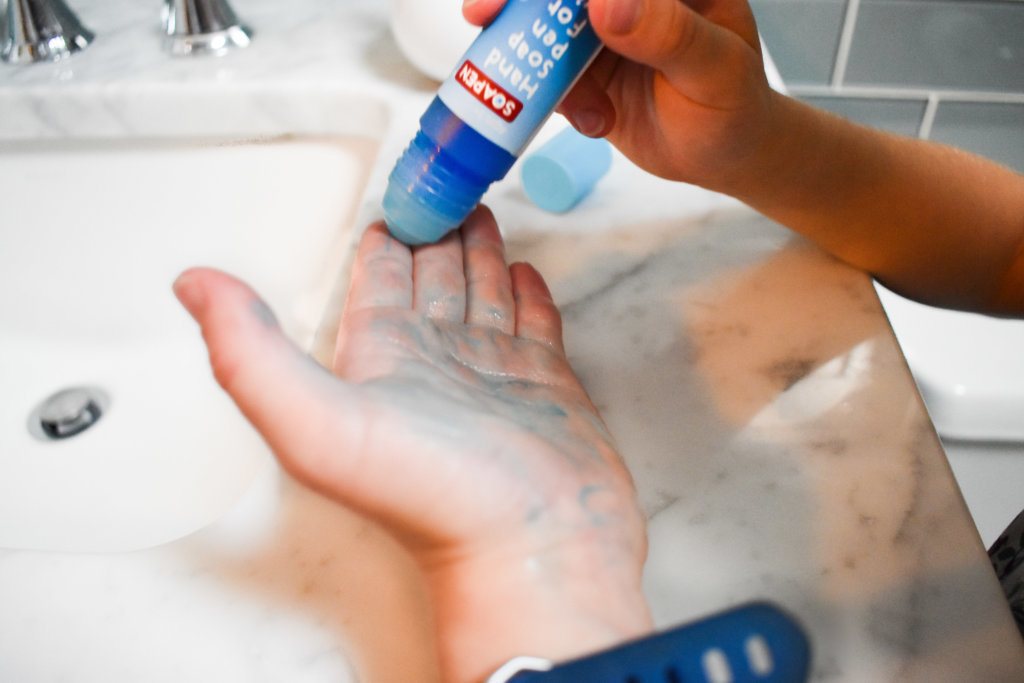Hand washing is one of the most effective ways to stop the spread of diarrheal and respiratory illnesses. In fact, researchers say a routine scrub with soap and water could prevent 1 million deaths each year.
But according to the Centers for Disease Control and Prevention, few follow through with the proper protocol — mainly the soap.
Clean hands are especially important for young children, who are more susceptible to illnesses. Plus, research shows routine hand washing can even advance their cognitive, communicative and motor development.
All of these statistics gave Parsons industrial design students Shubham Issar and Amanat Anand an idea: to make hand hygiene more accessible and enticing for little ones.
“We went to classrooms and realized that all kids were doing was drawing on their hands or on their books. So we wanted to merge something that they thought of as fun and something that they thought of as a chore and create something that they would really want to use,” Issar said.
And that’s how SoaPen came about. As the name suggests, it’s soap in the form of a thick pink, purple or blue pen. Children draw on their hands with the pen, and then when placed under water, the color turns to a lather — one that takes more than a few seconds to come off.
“In removing the traces of the drawing, the kids actually wash their hands for 20 to 40 seconds. So parents can be happy that the kids really washed their hands, and they have fun doing it,” Issar said.
The product, which launched to the public four months ago, has ushered in a great deal of praise. The concept won the Wearables for Good Challenge by UNICEF, ARM and frog design in 2016, and the founders were runners up for the James Dyson award in 2017.
On March 8, SoaPen will receive a $50,000 Mothers of Invention grant from Toyota at the Women in the World and Toyota’s annual DC Talk Shop event at The Wing.
Ahead of the event, held on International Women’s Day, Issar shared some insight on what it takes to be a successful female entrepreneur, as well as tips for those who aspire to be one.
On overcoming challenges:
After the idea for SoaPen won initial funding for development, Issar said the most challenging part was finding partners in the industry who supported the brand’s mission.

“It’s hard to be a young woman and enter the big world of soap manufacturing,” Issar said.
“We would talk to manufacturers on the phone and they wouldn’t realize how inexperienced and young we were and would be (on board), and then we would show up in person and a thousand problems would show up. All their quotes would be double of what it used to be; everything would change.”
It took some time, but eventually they found the right team to help them bring their vision to reality. Her advice: Keep at it and don’t settle.
On role models:
“I think overall there’s a perception about young women not really choosing entrepreneurship as their paths, so not having role models was one of the hurdles. You don’t really see a lot of brown young women who are entrepreneurs,” Issar said.
However, she said there are a lot of resources out there and she discovered plenty of people willing to offer their expertise or lend a different perspective. Connections are key, and Issar said she has made great ones through cold calls on LinkedIn to fellowship programs.
“I think persistence is a really important characteristic. I would also say really putting yourself out there and looking for industry-specific advisers,” she added.
On next steps:
Issar said the new $50,000 Mother of Invention grant will allow her and her colleagues to take SoaPen “to another level” while giving them the flexibility to plan for the future — one that may eventually include bath products.







